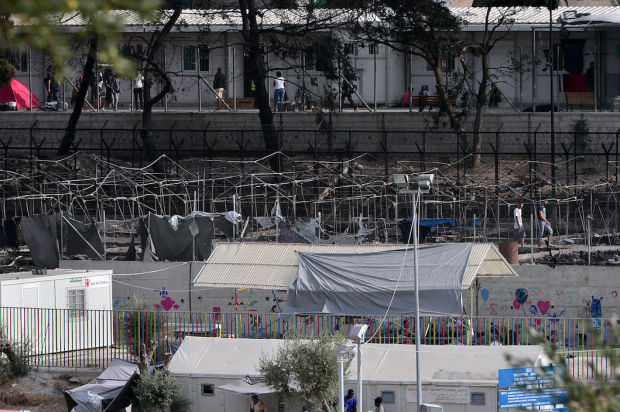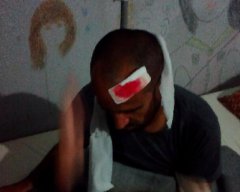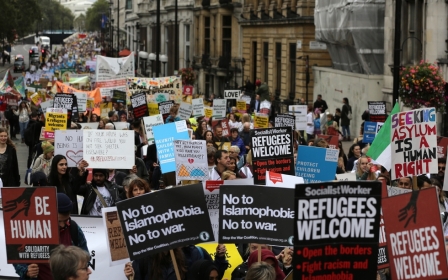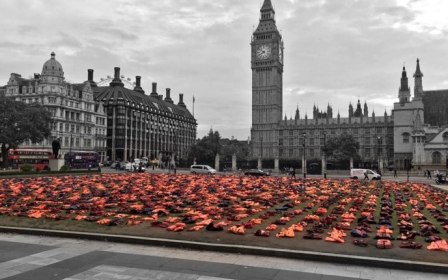Fire in Greek refugee camp 'was intentional and will happen again'
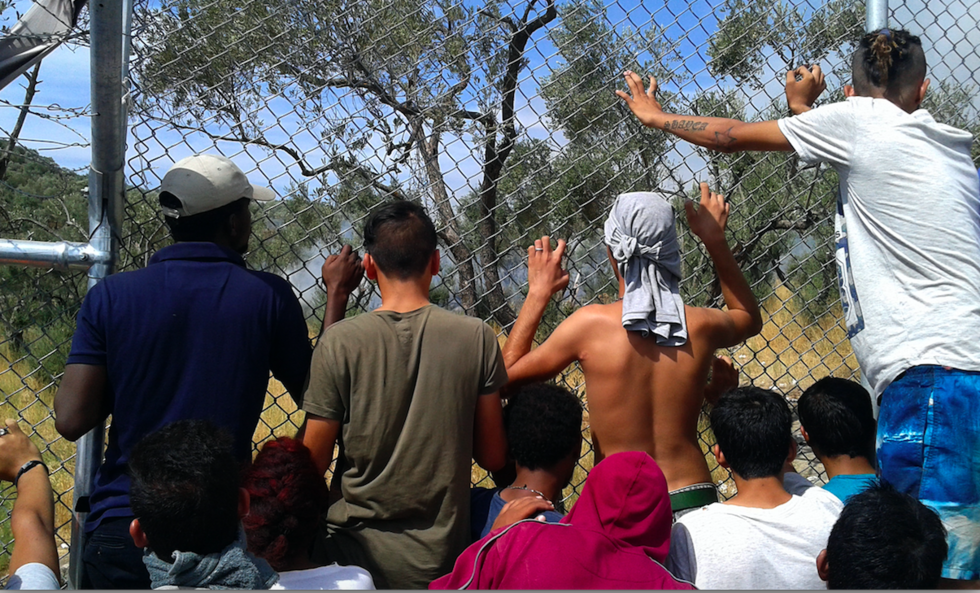
ATHENS, Greece – The Greek government on Tuesday said that it would send ships to Lesbos to act as temporary accommodation for refugees after devastating fire ripped through the Moria refugee ‘hotspot’ on the Greek island late on Monday.
An official from the spokesperson’s office of the Greek government’s Coordinating Body for the Refugee Crisis told Middle East Eye that the government would now send a commercial ship that could accommodate the refugees.
“We have made a call for ship-owners that have large ships that can hold more than 1,000 people to help. They will be used as a ‘back-up’ plan to hold refugees in cases of an emergency like this,” the official told MEE.
“At first it will be one but if it goes well maybe there will be another.”
Thousands of refugees and migrants were forced to flee to safety after the camp was badly damaged. There are now more than 5,600 people held in the Lesbos camp which was designed to hold around 3,000.
It is hoped the measure will alleviate tensions between locals and refugees, but with tempers also rising within the refugee and migrant community, many say that further clashes, protests and fires are likely to break out.
The Greek government has yet to confirm whether the fire was started deliberately, but migrants at the camp told MEE that the blaze was started out of frustration with delays in the asylum procedure and their detention in the camp.
Rami Alam, an Egyptian migrant in the camp, said that the fire was started on purpose and that the perpetrators intended to repeat the act if they were not moved from the camp onto the mainland.
“I heard many [migrants] speaking today who said ‘this is just the beginning’,” he told MEE by telephone. “They said ‘we will burn it again if we must stay here’. They want to leave, they want to go to Europe. They want Europe to have a solution for the refugees. I’m so worried. I know they will do it again.”
“No it wasn’t an accident. Definitely not, it was on purpose. If any fights happen again they will do it again, they will burn the fields and the camp.”
Ali Hassan, a migrant from Pakistan, also told MEE by telephone last night that he believed the fire was deliberate. “Some people started lighting fires with lighters. First the small tents, then the big tents and then the fire spread. Now, I think only 25 percent to 30 percent of the camp has not been burnt down.”
“There was a lot of damage, the fire was very big,” said Alam. “Afghans, Iraqis, Syrians, Africans lost their tents and their things. Luckily my tent was ok, but many were destroyed.”
The fire began after a peaceful protest by Syrians, Iraqis and African migrants and refugees got out of hand and quickly descended into inter-ethnic violence between refugees and migrants.
“A police captain tried to calm the crowd,” said Hassan. “He tried to explain to the refugees that he didn’t want them to be there either but that he couldn’t do anything.”
“Police used tear gas, but then they left the camp when they couldn’t stop the fighting.”
The situation in the refugee camp, which aid groups have condemned as unsafe and overcrowded, has been deteriorating since an EU/Turkey deal prevented refugees who arrive on the Greek islands after 20 March from leaving.
The deal originally envisioned that refugees whose asylum claims were rejected would be returned to Turkey but the deal has stalled due to a shortage of asylum officials and concern over whether Turkey is a safe third country for refugees.
“Returns are in the hands of EASO [European Asylum Support Office] and there are currently not enough EASO officials on the island,” the Greek official said. “As a result, things have stalled. But it is not the obligation of the Greek state. The number of applications is dependent on EASO. We have requested more officials and we will wait for them.”
“There is a miniscule number of EASO officials that carry the procedure. The EU/Turkey deal is not Greece’s initiative.”
According to the Greek government, no injuries occurred during the fire, however eyewitnesses have contradicted this.
“I saw many injuries,” she told MEE via phone. “People with respiratory problems from smoke inhalation, particularly the elderly and young, these were mainly people in the family compound. I saw people hurt with rocks and metal rods, head injuries, some broken bones, broken fingers, we made a lot of splints.”
“Refugees were reluctant to go to the hospital because they were worried if they did they’d be arrested for being involved in the violence,” she added.
Alam also told MEE that he witnessed many injuries. “I saw people with bloody heads and bloody hands and broken legs. I saw many Afghans and Syrians injured,” he said.
In response to the claims the official told MEE that he did not respond to “hearsay”.
“What I know and what I have been told is that there were no injuries,” he said. “Officially there were no injuries.”
Tensions between locals and refugees have been building on Lesbos and other islands in recent days as a solution to the crisis has not been found.
The day of the fire, Greek newspaper Ekathimerini reported that three female students, one of whom was known to work with refugees, were attacked by “ultra-nationalists” during a protest rally on Lesbos against the number of refugees on the island.
According to reports some members of the crowd chanted “throw them in the sea,” in reference to the refugees.
The Greek official said that “tensions in local society [on Lesbos] are caused by the far-right and local representatives”.
He added that he believed that Golden Dawn, the neo-Nazi party that’s currently under trial for being a criminal and is seen as the “face of the far-right in Greece” was helping to fuel division.
New MEE newsletter: Jerusalem Dispatch
Sign up to get the latest insights and analysis on Israel-Palestine, alongside Turkey Unpacked and other MEE newsletters
Middle East Eye delivers independent and unrivalled coverage and analysis of the Middle East, North Africa and beyond. To learn more about republishing this content and the associated fees, please fill out this form. More about MEE can be found here.


